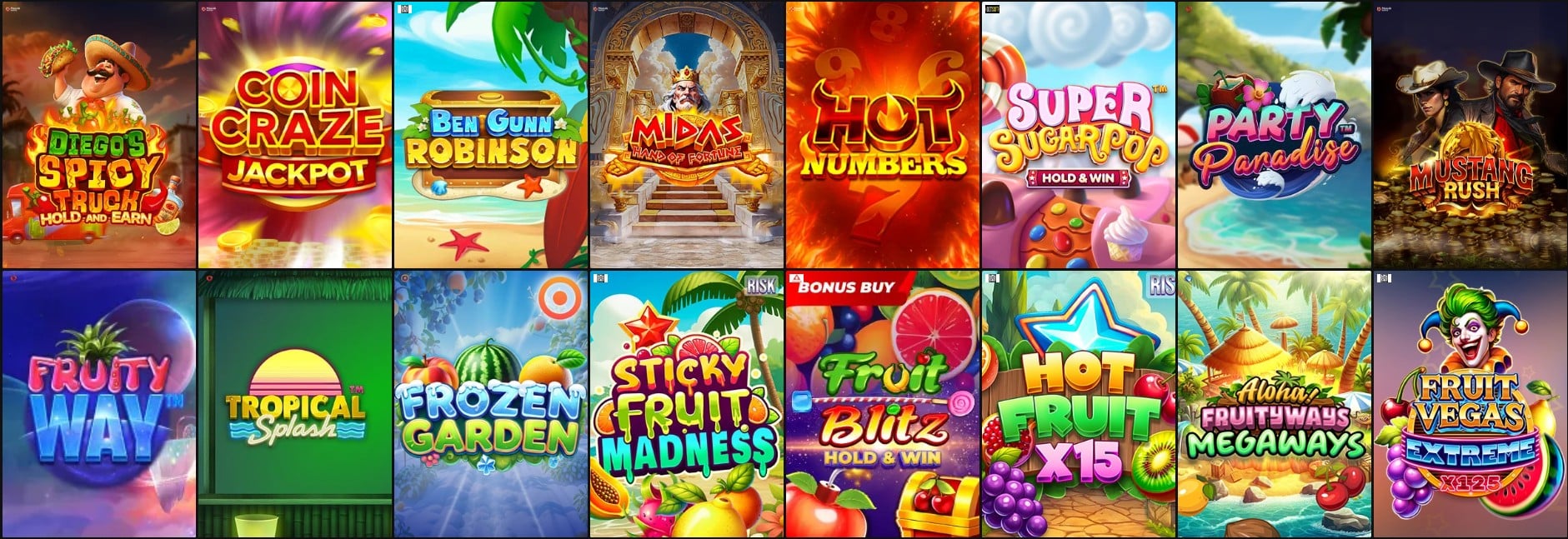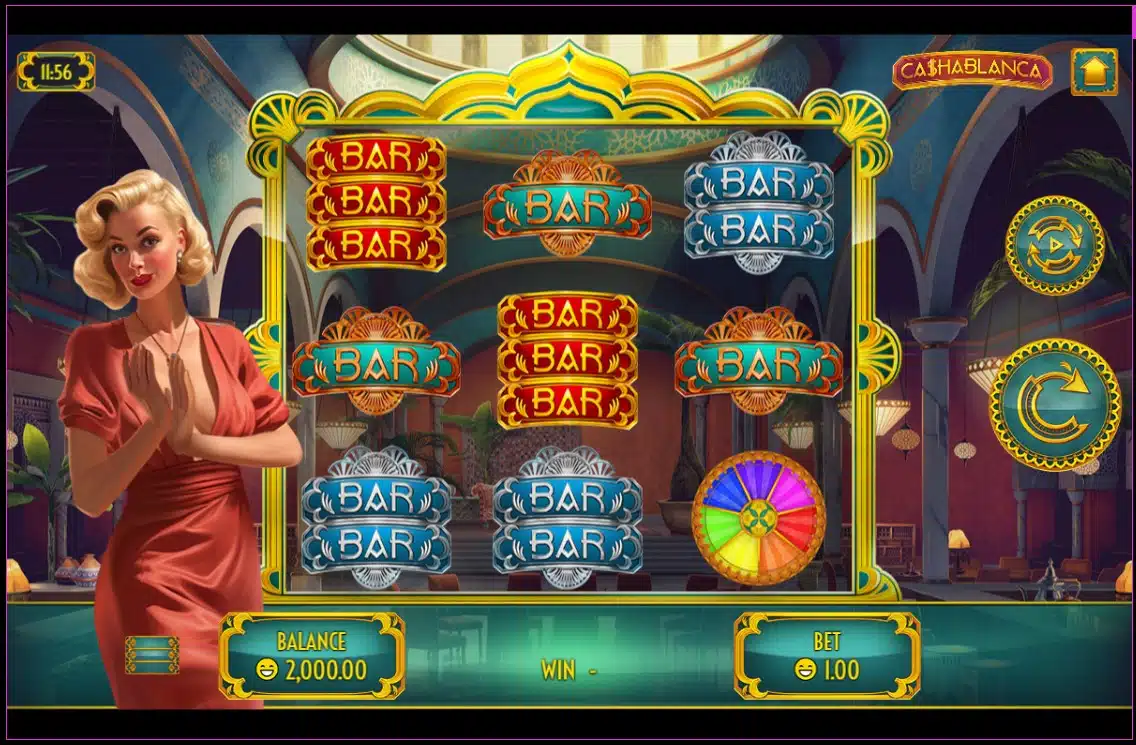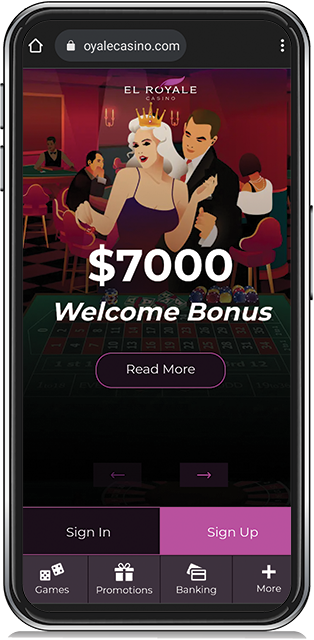Best Online Casinos for Slots in Welcoming slots players from the US and all around the world, offshore casinos are…

Best Online Casinos for Slots in 2026
Welcoming slots players from the US and all around the world, offshore casinos are the industry leader when it comes to offering online casino slots.
In this guide, we’ve established our top-ranked offshore casinos based on legality, trust, crypto options, and bonus offers.
Read on for everything you need to know before playing online casino slot games.
#1 Offshore Casino in 2026
Safe & Secure for US Players
Huge Promotions and Quick Payouts
#1 Offshore Casino in 2026
Safe & Secure for US Players
Huge Promotions and Quick Payouts
Introduction and Market Overview

If you think of Las Vegas or casinos in general, then it’s going to conjure up images of slot machines.
While many casino games require an in-depth knowledge of the rules and various strategies, slots offer a gateway into the world of casino games for every player.
Unlike the other options, no vast skill level is required. Instead, players often talk of lucky streaks and knowing when their luck is in. On the other hand, your bad luck can flip in an instant, which may explain why they’re so popular.
It was only natural that slots would form the cornerstone of any good online casino, and that’s just how it plays out with all of our recommended offshore sportsbooks building their experience around their slot games.
The beauty of slots is that they’re a blank canvas. There are numerous variations, themes, jackpots, and play limits, ensuring something for everyone.
As players in the United States will know, gambling can sometimes throw up legal grey areas, so we’ll explore in detail how offshore casinos operate and what your options are.
Currently, only seven states permit US-regulated online casinos to operate. These casinos are often subject to heavy regulation, which does protect the player, but it can also heavily restrict the overall experience.
Offshore casinos are still regulated, just not by US-based regulators. This may mean that player protections aren’t as stringent, but they tend to have the option to use cryptocurrency and access bigger and more frequent bonuses as well.
Included in this Guide
This guide to online casino slots covers all the key aspects of playing slots, from essential information for beginners to strategies and considerations that help you manage your bankroll effectively.
This includes one of the biggest questions from our players: How many different types of slot games are there? The answer is many, and we’ll break down what’s on offer and how they work.
We’ll also help you recognize legitimate casinos and operators before you start playing, while also examining what happens behind the scenes to give you peace of mind that the games are fair.
We’ve also got strategies and tips to help you get the most out of your experience, whether that be on desktop or on mobile, as an increasing number of players take the casino on the move with them.
Whether you’re a novice to the online slots world or a seasoned veteran, read on to discover everything you need to know about playing online slots in 2025.

Legal Landscape for Online Casino Slots
Regulated US States Overview
Regulated online casino slots operators must comply with extensive technical standards, financial requirements, and operational protocols designed to ensure game fairness, player protection, and regulatory compliance.
Random number generation systems require third-party testing and certification from approved testing laboratories such as Gaming Laboratories International (GLI) or eCOGRA.
These testing requirements ensure that online casino slots operate with appropriate randomness and return-to-player percentages that match advertised specifications.
Complete List of Legal States
US-regulated casinos are currently legally operating in:
- New Jersey
- Pennsylvania
- Michigan
- West Virginia
- Connecticut
- Detroit
- Rhode Island
State-Specific Regulations and Tax Implications
New Jersey
New Jersey pioneered the regulated online casino slots market in 2013, establishing comprehensive consumer protection measures, technical standards, and taxation structures that have served as models for other jurisdictions.
The New Jersey Division of Gaming Enforcement requires all online casino slots operators to partner with existing Atlantic City casinos, ensuring established gaming industry oversight and accountability.
Pennsylvania
Pennsylvania’s approach to regulating online casino slots emphasizes both revenue generation and consumer protection through oversight by the Pennsylvania Gaming Control Board.
The state requires substantial licensing fees and ongoing revenue-sharing arrangements while maintaining strict technical standards for random number generation, game fairness, and player fund protection.
Pennsylvania’s regulatory framework includes specific provisions for responsible gaming tools, self-exclusion programs, and resources for individuals struggling with problem gambling.
Michigan
Michigan’s regulated online casino slots market, launched in 2021, incorporates lessons learned from earlier regulatory implementations while addressing unique state-specific considerations.
The Michigan Gaming Control Board established comprehensive licensing requirements for both operators and software providers, ensuring multiple layers of oversight and accountability.
Michigan’s regulatory approach includes specific provisions for tribal gaming integration and revenue-sharing arrangements with existing casino operators.
Others
West Virginia, Connecticut, Delaware, and Rhode Island each maintain smaller but well-regulated online casino slots markets with state-specific requirements and operational considerations.
These jurisdictions demonstrate that successful online casino slot regulation is achievable, regardless of market size, provided that appropriate oversight mechanisms and consumer protection measures are implemented.
Age Requirements and Residency Restrictions
All regulated states require players to be at least 21 years old. Residency rules vary: most states require geolocation checks to verify in-state presence at the time of play.
New Jersey and Pennsylvania also allow military personnel stationed in the state, even if their official residence remains elsewhere.
Connecticut’s tribal compact extends gaming rights to any person physically located within state lines, regardless of residency.
Wire Act Implications for Online Slots
The Federal Wire Act of 1961 initially targeted interstate sports betting via wire communications, but its applicability to online casino games remains under debate.
A 2011 Department of Justice opinion clarified that the Wire Act prohibits all forms of interstate gambling transmission; however, a 2018 reversal narrowed its scope back to sports betting only. Today, regulated online slot sites operate under the assumption that the Wire Act does not bar them from accepting in-state wagers, but they must confine play strictly within state lines.
UIGEA Payment Processing Restrictions
The Unlawful Internet Gambling Enforcement Act (UIGEA) of 2006 does not outlaw online gambling per se, but prohibits financial institutions from processing payments for “unlawful internet gambling.”
Regulated state operators obtain carve-outs under state law, allowing them to utilize standard banking rails—such as credit cards, ACH, e-checks, and debit cards—to fund player accounts. Offshore operators, by contrast, often rely on e-wallets, cryptocurrencies, and third-party processors to circumvent UIGEA constraints.
Interstate Gambling Prohibitions
Under the Commerce Clause and specific federal statutes, no operator may accept wagers from a player physically located in a state where online casino gaming is not authorized.
Regulated operators employ geolocation technology to enforce these borders. Any breach—whether intentional or accidental—can result in license suspension, fines, or criminal penalties under both state and federal laws.
Legal Risks of Offshore Slot Play
Playing on an offshore site exposes US players to several legal uncertainties. Although few individuals face prosecution for purely placing a wager with an unlicensed site, banks and payment processors can freeze accounts, and seized funds are rarely recovered.
Without a state-issued license, offshore operators are outside the conventional oversight that ensures prompt, fair payouts.
Player Protections in Regulated Markets
Licensed US casinos must implement robust consumer safeguards:
- Third-party audited random number generators (RNGs)
- Mandatory self-exclusion and spending-limit tools
- Secure, encrypted transactions and data privacy controls
- Dispute resolution through state gaming commissions
These measures minimize the risks of fraud and compulsive play, ensuring that every spin is reliably fair.
Enforcement Realities and Priorities
Federal authorities have historically prioritized shutting down payment channels feeding offshore sites rather than prosecuting end users. State regulators focus on maintaining integrity and public safety in licensed markets.
As a result, American players face minimal enforcement risk when enjoying regulated sites. At the same time, offshore play remains a “buyer beware” proposition—vulnerable to sudden account freezes, payout refusals, or disappearing customer support.


Join the excitement of Roulette, the classic casino game dating back to 18th-century France. Spin the wheel, predict the ball`s final stop, and embrace the thrill of chance. With its numerous betting options, Roulette offers endless fun. Place your bets and spin the wheel now!

Step into the world of Blackjack, also known as 21, a card game celebrated in casinos worldwide. It`s the perfect blend of skill, strategy, and a dash of luck. Your aim? Outsmart the dealer with a hand value closest to 21, without going over. Ready to test your skills?

Experience the high-energy thrill of Craps, the fast-paced dice game loved by casino-goers. Gather around the table, bet on dice outcomes, and ride the wave of chance and strategy. With a wide range of betting options, Craps guarantees an exhilarating time! Ready to roll the dice?
Types of Online Casino Slots

As previously mentioned, there is no exact requirement for a slot game. They can take many shapes and forms, offering variety and different features. This is our comprehensive list of the various slot games and varieties our players can expect to find when playing online casino slots.
3-Reel Traditional Slots
Classic slots capture the essence of old-school casino floors with three spinning reels and a single payline.
You’ll find symbols like cherries, bars, and lucky 7s aligned in neat rows, delivering a straightforward “spin-and-win” experience.
Volatility is typically low, meaning you see frequent small wins—perfect for players who prefer a relaxed session and steady bankroll management.
Fruit Machines and Retro Themes
Fruit-themed slots started it all. These retro machines lean into nostalgia with pixelated fruit icons, mechanical reel sounds, and minimalist payout tables.
The gameplay is delightfully simple: line up three identical symbols, and you trigger a payout. No flashy animations, no swirling bonus rounds—just pure, unfiltered slot action that pays homage to the 1960s bar scene.
5-Reel and Multi-Payline Games
Video slots expanded possibilities with five reels and a range of 10 to 1,024 paylines. Here, paylines snake diagonally, zig-zag, or fan out across the grid, giving you countless ways to win. Betting options usually start low—around $0.10 per spin—and can scale up to dozens of dollars by adjusting active paylines and coin values.
Advanced Graphics and Animations
Modern video slots rival blockbuster video games. Developers use HTML5 and WebGL to render 3D characters, dynamic backgrounds, and cinematic soundtrack scores.
Whether you’re battling dragons in a fantasy realm or cruising the neon streets of a cyberpunk city, the immersive visuals keep each spin engaging and captivating.
Bonus Features and Mini-Games
What sets video slots apart are their bonus mechanics. Common features include:
- Free spins with sticky wilds or expanding reels
- Pick-and-click mini-games that unlock hidden multipliers
- Cascading reels that remove winning symbols and refill gaps
- Random wild generators, where wild symbols appear at unpredictable moments
These extras elevate excitement and offer the potential for large payouts beyond base-game spins.
Progressive Jackpot Slots
Progressive jackpot slots represent the pinnacle of online casino slots excitement, offering the potential for life-changing payouts that can reach millions of dollars.
These games feature jackpot pools that increase with each wager placed across networked games, creating prize pools that far exceed the maximum payouts available in standard slot games.
The progressive jackpot category generates significant player interest and engagement, contributing to the overall appeal of online casino slots platforms.
How Progressive Jackpot Systems Work
Progressive jackpot networks operate through sophisticated systems that collect small portions of each wager and contribute them to shared prize pools.
Local progressives limit jackpot contributions to single games or operators, while wide-area progressives connect games across multiple operators and jurisdictions to create massive prize pools.
The largest progressive jackpot networks, such as Microgaming’s Mega Moolah series, have awarded individual prizes exceeding $20 million, demonstrating the extraordinary potential of these systems.
Jackpot Winning Strategies and Odds
Progressive jackpots are essentially a matter of luck—no strategy can significantly alter the odds. That said, to qualify for the top prize, you almost always must bet the max lines and coins.
Understand the trade-off: bigger bets increase jackpot eligibility but can deplete your balance more quickly.
Always check the game’s paytable for maximum-bet requirements and RTP (return to player) percentages.
Branded and Licensed Slots
Branded and licensed slots represent a significant category within the online casino slots market, featuring content based on popular movies, television shows, music artists, and other entertainment properties.
These games leverage familiar characters, storylines, and audio-visual elements to create immediate recognition and emotional connection with players who are fans of the source material.
The development of branded slots requires complex licensing agreements between game developers and content owners, often involving revenue-sharing arrangements and approval processes for creative content.
These partnerships enable game developers to access high-quality source material while providing content owners with additional revenue streams and promotional opportunities for their properties. Successful branded slots often coincide with the release of movies, the launch of television series, or anniversary celebrations of classic entertainment properties.
Movie and TV Show themes
Studios like Sony, Warner Bros., and Marvel partner with slot developers to bring blockbuster IPs to the reels. Think Jurassic Park’s roaming dinosaurs, Game of Thrones’ house sigils, or E.T.’s alien adventure.
These branded slots heavily rely on familiar music, voice clips, and cinematic cutscenes—offering fans a two-fold rush of nostalgia and wagering excitement.
Music and Celebrity Slots
Ever imagined spinning alongside your favorite pop icon? Music-themed slots immortalize stars like Elvis Presley, Guns N’ Roses, or Travis Scott with hit-track soundboards and concert footage.
Celebrity editions feature exclusive interviews, behind-the-scenes clips, and custom animations. If you’re a fan, these titles blur the line between entertainment and gambling.
Licensing Considerations and Authenticity
When a slot claims to be “official,” look for a seal of approval from major licensors, such as Disney, HBO, and Universal. Authentic branded slots pay hefty licensing fees, which can translate into polished design and guaranteed royalty payments back to IP owners.
In contrast, offshore or unlicensed clones may mimic themes poorly and offer no recourse if the game malfunctions or misrepresents payouts.
How Online Casino Slots Work

Unlike physical casinos, where the game is happening in front of your eyes, online casinos work with a graphical representation of the games. As a result, it’s absolutely crucial that player trust is built and maintained regarding fair outcomes.
Any slot games from our recommended offshore casinos are legit and fair to use, and this is how they operate:
Random Number Generation (RNG)
Random Number Generators (RNGs) are algorithms—often pseudorandom—that produce sequences of numbers mimicking true randomness.
Each number corresponds to a symbol position on a slot’s reels. Modern online slots rely on RNGs to ensure that every spin outcome is unpredictable and independent of previous results.
RNGs operate continuously, generating thousands of numbers per second. When you click “spin,” the software grabs the current RNG output to determine the position of each reel. This process guarantees that spin outcomes cannot be predicted or manipulated by players or operators.
How RNG Ensures Fairness
RNGs embed fairness through unpredictability and independence:
- Unpredictability: Since outputs follow complex algorithms with large seeds, no pattern is discernible to humans or bots.
- Independence: Each spin is isolated; past results have no bearing on future outcomes, preventing “due” wins or streaks.
In practice, this means you could win on the first spin or on the millionth—pure chance governs the result.
Online casino platforms integrate RNGs deep within their gaming software, making it technically infeasible for any external party to bias the outcome.
Third-Party Testing and Certification
Independent testing labs audit and certify RNG implementations. Common certifiers include:
| Certification Body | Role | Notable Feature |
|---|---|---|
| eCOGRA | Tests game integrity and payout fairness | Player protection seal |
| iTech Labs | Certifies RNG algorithms and software reliability | Automated test suites |
| GLI (Gaming Labs) | Provides global compliance testing and certification | Wide jurisdiction coverage |
These bodies run thousands of simulated spins, statistical tests (e.g., chi-square), and code reviews to confirm that RNG outputs align with theoretical randomness and advertised Return to Player (RTP) rates.
Understanding True Randomness
While “true” randomness can derive from hardware-based sources (e.g., radioactive decay, thermal noise), online casinos almost always utilize pseudorandom algorithms due to performance and scalability.
Despite being deterministic, well-designed pseudorandom algorithms pass rigorous statistical tests, producing outputs that are indistinguishable from those of true random sequences.
Players should look for certification seals indicating that the RNG has undergone deep analysis and audit.
Return to Player (RTP) Rates
Although there are industry standards for RTP rates, they vary from operator to operator. It’s also essential to bear in mind that they’ll vary between slot games from the same provider as well.
What RTP Percentages Mean
Return to Player (RTP) is the theoretical percentage of wagered money a slot returns over a large number of spins. For example, a 96% RTP means that, in the long run, the slot will pay back £96 for every £100 wagered.
It’s essential to recognize that RTP is calculated over millions of spins; individual sessions can deviate significantly from this average.
Industry Standard RTP Ranges
Slot RTPs vary by jurisdiction and operator strategy. Common ranges include:
| Jurisdiction | Typical RTP Range |
|---|---|
| European casinos | 95% – 98% |
| UK-licensed casinos | 95% – 97% |
| Offshore sites | 92% – 97% |
Higher-RTP slots theoretically offer better returns to players, but they often come with other trade-offs, such as lower jackpot sizes or increased volatility.
How to Find RTP Information
RTP details are usually disclosed in one of three places:
- Game Info Panel: Click the “i” or “Help” button on the slot interface.
- Casino help pages: Operators frequently publish a list of RTPs under “Game Rules” or “Frequently Asked Questions.”
- Independent reviews: Reputable review sites aggregate RTP data across hundreds of titles.
Always cross-check multiple sources, as RTP values can change after software updates or changes in jurisdictional regulations.
Volatility and Variance
Volatility—also known as variance—measures the risk profile of a slot. It reflects the frequency and magnitude of wins:
- Low volatility: Frequent, smaller wins.
- Medium volatility: Balanced win frequency and size.
- High volatility: Rare, larger wins.
Volatility does not affect the RTP, but it can significantly impact the frequency and size of payouts on certain games.
Remember that the RTP is based on every player and not just you.
Low vs High Volatility Slots
| Feature | Low Volatility | High Volatility |
|---|---|---|
| Win Frequency | High (many small wins) | Low (infrequent big wins) |
| Typical Win Size | 2×–5× stake | 20×–1,000× stake |
| Bankroll Impact | More stable spending curve | Bigger swings—can bust or balloon fast |
| Ideal Player Profile | Conservative, low-bankroll players | Thrill-seekers with substantial funds |
Low-volatility slots are ideal for players who prefer smaller, steadier payouts and longer gameplay sessions. High-volatility titles appeal to those chasing life-changing jackpots, accepting extended dry spells.
Risk-Reward Relationships
Volatility and RTP together define a slot’s risk-reward silhouette:
- High RTP + Low volatility: Cushion against losing streaks but smaller rewards.
- High RTP + High volatility: Fair returns over time, but cash swings require a strong bankroll.
- Low RTP + High volatility: Risky—chasing big wins on an unfavorable house edge.
- Low RTP + Low volatility: Short-lived play with minimal excitement and poor returns.
Matching volatility with your tolerance for risk ensures you enjoy the game without stretching your bankroll beyond safe limits.
Choosing Slots Based on Bankroll
Effective bankroll management tailors game selection:
- Bankroll under £100: Lean toward low-volatility, mid-RTP slots (96%–97%) to extend play.
- Bankroll £100–£500: Explore medium volatility with RTPs above 95.5% for balanced thrills.
- Bankroll over £500: Consider high-volatility slots with RTPs near 96% if chasing big wins.
Set session limits, define loss thresholds, and avoid “tilt” by sticking to games aligned with your financial comfort zone.
Practical Tips for Players
- Always verify the developer’s reputation. Industry-leading studios (e.g., NetEnt, Microgaming, Play’n GO) invest heavily in RNG integrity and openly share certification details.
- Look for independent audit certificates on the casino’s footer or the game provider’s website. These are your best guarantee of fairness.
- Use demo modes to assess volatility firsthand before staking real money.
- Keep a personal log of spins, wins, and losses to track your own variance and avoid chasing losses.
- Familiarize yourself with bonus features (free spins, multipliers) that can affect effective volatility and payouts.
- If RTP information isn’t apparent, contact customer support for documented confirmation.
Free vs Real Money Slots

The best online casinos offer two ways to play their slot games: a demo or free mode, and a real-money mode. The demo mode allows players to test and adapt to new games, but in a safe and easy environment.
Real money versions of games are just as they sound. Your real money is at stake, and that brings psychological pressures and decision-making into play.
Free Online Casino Slots
Free slots operate on the same software as real-money versions, but they use virtual credits instead of cash. You can access them without depositing funds, making them widely available on casino sites and game review platforms. Free slots exist to showcase gameplay mechanics, themes, and bonus features. They deliver the complete visual and interactive experience but omit monetary risk and reward. This makes them ideal for newcomers, casual players, and anyone curious about a new title.
Demo Mode Benefits and Limitations
- Instant access without registration or deposit—unlimited playtime until you exhaust virtual credits.
- Full exposure to bonus rounds, free spins, and paytable structures.
- No chance of winning real cash or triggering real jackpots.
- Potential for outdated software in some demo-only libraries.
Free demos are controlled environments: wins and losses have no financial impact, and game settings may be locked to a particular volatility or RTP for demonstration purposes.
Practice Without Financial Risk
Playing in demo mode allows you to:
- Familiarize yourself with paylines, symbols, and betting levels.
- Test strategic features like adjustable paylines, bet multipliers, and autoplay.
- Identify slot volatility by observing hit frequency and payout sizes.
- Learn bonus mechanics (pick-and-click, cascading reels, expanding wilds).
Practice sessions help you refine betting patterns and gain confidence before wagering real stakes. This hands-on learning builds muscle memory without incurring losses.
Game Evaluation Opportunities
Free play gives you a clear view of a slot’s overall appeal:
- Theme and graphics quality
- Audio design and user interface
- Feature complexity and engagement
- Session length and pacing
By evaluating these elements upfront, you avoid spending real money on a game that fails to resonate. You can shortlist your favorites and create a target list for real-money trials.
Real Money Online Slots
Turning to real money play transforms the demo experience into genuine wagering. You deposit funds, place bets with your own money, and can win—or lose—real cash.
Before you can spin for real, most licensed casinos enforce legal and regulatory checks. These measures protect both operators and players, ensuring a safe gaming environment.
Legal Requirements and Age Verification
- Mandatory Know Your Customer (KYC) procedures.
- Verification of identity using official documents (ID, utility bill).
- Age checks require you to be 18 or older (21 in some jurisdictions).
- Geo-location tools ensure compliance with regional gambling laws.
Completing KYC can take anywhere from a few minutes (for automated checks) to several days (for manual reviews). First-time withdrawals are often held until full identification verification is complete.
Payment Methods and Processing
Online casinos support a variety of deposit options:
- Credit/debit cards (Visa, Mastercard)
- E-wallets (PayPal, Skrill, Neteller)
- Prepaid vouchers (Paysafecard)
- Cryptocurrencies (Bitcoin, Ethereum, USDT)
Deposit processing is typically instant, allowing you to start playing real-money slots right away. Some methods incur fees, so always check the casino’s banking page before funding your account.
Withdrawal Procedures and Timeframes
Withdrawing your winnings involves:
- Confirming your account details and KYC status.
- Select a withdrawal method supported by the casino.
- Meeting any wagering or bonus-related requirements.
Typical processing times:
| Withdrawal Method | Processing Time |
|---|---|
| E-wallets | Instant – 24 hrs |
| Credit/debit card | 1–5 business days |
| Bank transfer | 3–7 business days |
| Cryptocurrency | Instant – 2 hrs |
Casino policies often cap maximum withdrawal amounts per transaction or per day, so review the fine print to plan large cash-outs.
Transitioning from Free to Real Money Play
Moving from demo play to real-money spins is a pivotal step. It introduces real financial stakes and emotional intensity that can alter your decision-making. Establish a clear transition strategy to minimize impulsive bets and safeguard your bankroll. Follow these guidelines to make the shift smooth and sustainable.
Bankroll Management Principles
- Define your deposit limit before playing.
- Break your bankroll into session budgets.
- Use fixed-bet or percentage-based staking (1–3% of your total bankroll per spin).
- Record wins and losses in a play log.
- Never chase losses by increasing bet size above your limit.
Solid bankroll management guards against tilt—a state of frustration that can lead to reckless wagering.
Setting Realistic Expectations
- Understand that demo-mode wins do not guarantee real-money success.
- Recognize that volatility can feel more intense when real funds are at risk.
- Aim for entertainment value first, profit second.
- Accept that short-term losses are part of the long-term RTP equation.
Adjust your win and loss thresholds to reflect both your playing style and your financial comfort zone.
Understanding the Psychological Differences
Free and real-money play trigger different mindsets:
- Demo mode feels like a game or tutorial, reducing stress and encouraging exploration.
- Real money raises adrenaline, evokes fear of loss, and can cloud judgment.
- Near misses and bonus triggers feel more impactful when real stakes are involved.
- Responsible players cultivate emotional awareness—taking breaks when frustration peaks and celebrating small wins.
By acknowledging these psychological shifts, you maintain control and make more rational betting decisions.
Feature Comparison
| Aspect | Free Slots | Real Money Slots |
|---|---|---|
| Financial Risk | None | Actual loss and gain |
| Payouts | Virtual credits | Real cash payouts |
| Registration | Optional | Mandatory KYC and age checks |
| Bonus Offers | Rarely available | Welcome bonuses, cashback, loyalty |
| Emotional Impact | Casual, low stress | High stakes, emotional swings |
| RTP and Volatility | Often fixed for demo but may vary | True live settings and dynamic |
Practical Tips for Players
- Use free modes to build familiarity, not as a guarantee of profit.
- Read casino terms and conditions on bonuses, wagering requirements, and withdrawal limits.
- Diversify slots: alternate between low, medium, and high volatility titles to balance enjoyment and risk.
- Schedule regular sessions and set time-outs to avoid fatigue and impulsive play.
- Explore casino loyalty programs once you’re wagering real money to maximize long-term value.
Top Online Casino Slot Providers

The online casino landscape thrives on innovation, variety, and trust. At the heart of every thrilling spin and dazzling jackpot stands a software provider. These studios design the reels, shape the mechanics, and set the standards players come to expect. This deep dive explores the sector’s heavyweights—examining their histories, reputations, flagship titles, and the mobile-first technologies that keep slots spinning across devices.
NetEnt, Microgaming, Playtech Overview
Across the globe, a handful of developers dominate the online slots market. They’ve built cemented reputations for fairness, technical prowess, and headset-gripping gameplay.
NetEnt
Founded in 1996 in Stockholm, NetEnt pioneered modern video slots. Its reputation rests on sleek design, innovative features, and industry-leading volatile mechanics, such as “cluster pays” and avalanche reels.
Microgaming
Dating back to 1994, Microgaming claims to be the first true online casino software. It’s renowned for massive progressive jackpots—such as Mega Moolah—and its commitment to Random Number Generator (RNG) integrity.
Playtech
Established in 1999, Playtech excels in licensed-branded content and live casino integration. Its portfolio spans blockbuster movie tie-ins, VR-enabled games, and integrated Sportsbook modules.
IGT, Scientific Games, Aristocrat
Land-based titans have successfully transitioned to the online sphere, bringing decades of slot innovation to browsers and apps.
IGT (International Game Technology)
The world’s largest slot-maker, IGT, traces its roots to Las Vegas’ gaming floors. Online, it recreates iconic titles like Cleopatra and Wheel of Fortune, blending legacy mechanics with digital bonus rounds.
Scientific Games
Formed through the mergers of WMS and Bally, Scientific Games offers content ranging from electronic table games to high-end progressive networks. It’s “Reel Power,” and branded tie-ins reinforce a premium positioning.
Aristocrat
Australia’s most prolific developer, Aristocrat, brings chart-topping land-based hits—such as Buffalo—to the web. Its “5-Level Bonus” architecture and engaging social gaming spin Mine, crafting new digital classics.
Quality Indicators and Reputation Factors
When evaluating providers, several benchmarks distinguish the great from the merely good. These quality indicators ensure players encounter fair, secure, and exciting experiences.
Fairness & Certification
- Independent RNG audits by eCOGRA, iTech Labs, and GLI.
- Published Return to Player (RTP) rates and variance disclosures.
Licence & Compliance
- Holding licenses from UKGC, MGA, Gibraltar, or Curacao.
- Adherence to anti-money laundering (AML) and Responsible Gaming policies.
Technical Stability
- Cross-platform compatibility and load-time benchmarks.
- Uptime guarantees and robust back-end infrastructure.
Innovation Track Record
- Patented mechanics (e.g., NetEnt’s Cluster Pays, Microgaming’s Megaways partnerships).
- Experimental formats: cascading reels, tumbling symbols, and skill-based bonus rounds.
Industry Awards & Partnerships
- EGR B2B Awards, SBC Innovation Prizes, and G2E acclaim.
- High-profile tie-ins with intellectual properties and sports leagues.
Game Portfolio Analysis
A provider’s portfolio reveals its creative DNA and commercial priorities. Two key dimensions stand out:
- Breadth of Themes
From ancient civilizations to sci-fi epics, leading studios cover every niche. Players can find everything from classic 3-reel slots to narrative-driven, multi-level video slots. - Feature Depth
Modern slot game mechanics—wilds, scatters, multipliers, re-spins, and buy-bonus options—to sustain engagement. Providers differentiate by how they weave these features into seamless user journeys.
| Developer | Theme Diversity | Feature Highlights | Avg. RTP Range |
|---|---|---|---|
| NetEnt | Mythology, fantasy, crime | Avalanche, Cluster Pays, Buy-Bonus | 96.1%–98.0% |
| Microgaming | Classic, branded, sci-fi | Progressive jackpots, Super Mode | 94.0%–96.0% |
| Playtech | Movie, TV, sports, VR | In-game Sportsbook link, Smart Spins | 95.0%–97.5% |
| IGT | Big-brand franchises | Multi-level bonus, Wheel of Fortune | 94.5%–97.0% |
| Scientific Games | Musical, film, legacy | Reel Power, Mystery Jackpot | 95.0%–97.0% |
| Aristocrat | Animal, adventure, social | 5-Level Bonus, Buffalo Megaways | 96.0%–97.5% |
Popular Titles and Franchises
Every top provider boasts a handful of landmark titles that define eras and attract millions.
- NetEnt: Starburst, Gonzo’s Quest, Divine Fortune
- Microgaming: Mega Moolah, Immortal Romance, Thunderstruck II
- Playtech: The Dark Knight Rises, Gladiator Jackpot, Kingdoms Rise
- IGT: Cleopatra, Da Vinci Diamonds, Siberian Storm
- Scientific Games: Wheel of Fortune Triple Extreme Spin, Monopoly Megaways
- Aristocrat: Buffalo, Queen of the Nile, Lightning Link
Franchise strength lies in brand recognition, replay value, and cross-title bonus ecosystems—players often follow their favorite game mechanics across multiple releases.
Innovation in Slot Development
Innovation drives the industry forward, evolving how games perform, feel, and reward players.
Megaways Mechanics
Developed by Big Time Gaming and licensed by Microgaming, Megaways offers up to 117,649 dynamic paylines—spurting fresh payout patterns on every spin.
Cluster Pays & Avalanche Reels
Replacing paylines with symbol clusters or cascading wins (NetEnt’s Gonzo’s Quest) heightens suspense and extends win sequences.
Skill-Based Bonuses
A nascent trend: allowing players limited agency—aiming virtual darts or selecting objects yields variable rewards while maintaining house edge.
3D & VR Slots
Interactive 3D graphics and early VR experiments (Playtech’s VR roulette prototypes) hint at future fully immersive casino environments.
Blockchain and Provably Fair
Some studios explore blockchain for transparency—smart contracts verify payouts, enhancing trust for crypto-savvy audiences.
Mobile Optimization Standards
With over 70% of online casino traffic coming from mobile devices, providers must deliver seamless touch-first experiences.
HTML5 Over Flash
HTML5 engines enable quick loading, fluid animations, and device-agnostic performance.
Responsive Layouts
Auto-adjusting interfaces, scalable buttons, and dynamic canvas orientation guarantee playability across phones and tablets.
Lightweight Asset Management
Lazy loading of assets, compressed audio, and optimized sprite sheets reduce data usage and improve spin-to-spin times.
Battery & Performance Management
SDKs monitor CPU usage, throttle frame rates, and offload sound processing to conserve battery life during extended sessions.
Integrated Tournaments and Leaderboards
Real-time competitions and social sharing are built directly into the mobile UI, keeping players engaged and connected.
Safety and Security Considerations
When you step into the world of online casinos, safety and security aren’t optional extras—they’re foundational. A robust framework of licensing, financial safeguards, and technical defenses protects both players and operators. This section dives deep into the critical measures you should vet before committing your time and money. From verifying licenses to encryption standards, these best practices help you enjoy gaming with confidence.
Choosing Legitimate Operators
Before creating an account, assessing an operator’s legitimacy is crucial. A few minutes of due diligence can save you from lost funds, compromised data, and regulatory headaches down the line.

Licensing Verification Procedures
Check that the casino holds valid licenses from reputable authorities. Look for:
- License number displayed in the website footer
- Links to the issuing regulator’s license registry
- License validity period and past renewal history
Visiting the regulator’s portal and cross-referencing the license number confirms that the casino’s operations match the license details.
Regulatory Oversight Quality Assessment
Not all licenses are created equal. Compare quality indicators among jurisdictions:
| Regulator | Reputation Level | Player Protections | Annual Audits |
|---|---|---|---|
| UK Gambling Commission | Very High | Mandatory self-exclusion, deposit caps | Yes |
| Malta Gaming Authority | High | Responsible gaming codes, AML reviews | Yes |
| Gibraltar Regulatory | High | Rigorous financial compliance | Yes |
| Curacao eGaming | Medium | Basic AML requirements | Sporadic |
Red Flags and Warning Signs
Watch out for telltale warning signs that indicate a risky operator:
- No clear licensing information or broken verify links
- Unrealistic welcome bonuses with impossible wagering terms
- Poorly written Terms & Conditions or missing responsible-play policies
- Anonymous ownership details and opaque corporate structure
- Complaints about non-payment or abusive customer service
If multiple red flags pop up, move on. A trustworthy operator welcomes scrutiny and transparency.
Financial Security
A casino’s financial infrastructure determines how your funds are handled from deposit to withdrawal. Secure payment processing, account protection, and reliable cash-out procedures are non-negotiable.
Secure Payment Processing
Top casinos integrate with vetted payment gateways using:
- PCI DSS compliance for card transactions
- Tokenization to avoid storing raw card data
- 3D Secure or equivalent two-factor authentication on deposits
These safeguards ensure that even if a database breach occurs, your card details remain protected.
Fund Segregation and Protection
Reputable operators segregate player funds from operational capital. This practice means:
- Customer deposits are stored in separate trust accounts
- Insolvency of the casino cannot touch player money
- Regular audited reporting on fund balances
Always look for language in the Terms & Conditions that explicitly states “player funds are held in segregated accounts.”
Withdrawal Reliability and Timeframes
Transparent withdrawal processes are a hallmark of trustworthy casinos. Typical timeframes by method include:
| Withdrawal Method | Expected Processing Time |
|---|---|
| E-wallets | Instant – 24 hours |
| Cryptocurrencies | Instant – 2 hours |
| Credit/Debit Card | 1–5 business days |
| Bank Transfer | 3–7 business days |
Beware operators that tack on unexplained delays or processing fees. A fair casino chalks up standard banking costs but doesn’t penalize players beyond that.
Technical Security
Behind the scenes, sophisticated IT measures protect both the casino’s platform and your personal data. From encrypted connections to hardened account safeguards, these are the hallmarks of a secure gaming environment.
SSL Encryption Standards
Any reputable casino enforces end-to-end encryption:
- Minimum 128-bit SSL, preferably 256-bit TLS
- Visible padlock icon and HTTPS in the browser address bar
- Certificate issued by trusted CAs (e.g., DigiCert, Let’s Encrypt)
Verify these by clicking the padlock to view certificate details and expiration—expired or self-signed certificates are major red flags.
Account Security Best Practices
Securing your own account layers additional defense:
- Use a unique, complex password per site (12+ characters, mix of cases, symbols)
- Enable two-factor authentication (2FA) via SMS or authenticator apps
- Regularly review login history and active device sessions
- Log out after each session, especially on shared devices
A personal security routine minimizes the damage if a casino’s database is ever compromised.
Personal Data Protection Measures
Casinos collect sensitive data—ID documents, payment details, contact information—which demands rigorous protection:
- GDPR or similar privacy-law compliance declarations
- Data retention policies outlining how long personal data is stored
- Secure upload portals for KYC documents with encrypted file transfer
- Option for users to request data deletion or export
When in doubt, consult the casino’s privacy notice. A robust policy demonstrates respect for your personal information and adherence to legal obligations.
Best Practices Checklist
Before you press “Sign Up,” run through this checklist:
- License verified on the regulator’s official site
- Clear Terms & Conditions with responsible-play options
- PCI DSS and SSL/TLS encryption certificates in place
- Segregated trust accounts for player funds
- Transparent withdrawal times and no hidden fees
- Strong privacy policy and GDPR (or equivalent) compliance
- Two-factor authentication is available on accounts
- No history of significant data breaches or regulatory fines
If any item is missing or unclear, reach out to support for clarification. A reputable casino will respond promptly and transparently.
Responsible Gambling for Slot Players
Maintaining control while enjoying online or land-based slot machines ensures that gaming remains a fun pastime rather than a source of stress.
This section examines the distinct risks associated with slots, offers practical boundary-setting techniques, and highlights support resources if play ever becomes problematic.
Understanding Slot Machine Risks
Slot machines offer rapid-fire gameplay and immersive design. While these features fuel excitement, they can also amplify risk factors unique to the medium. As there’s no skill involved in slot games, it can also be easy to believe your luck is due to turn, and the lack of control in the game can leak into your decision-making, too.
High-Speed Gameplay Concerns
Slot sessions often transition from spin to spin in just seconds. Fast-paced rounds can:
- Blur perceptions of time, leading players to spend far longer than intended.
- Reduce opportunities to reflect on losses and adjust betting strategies.
- Encourage continuous play during both winning and losing streaks due to instant stimulus and reward feedback.
Recognizing the tempo of slot sessions helps you pause between spins and stay aware of your play pattern.
Loss Chasing Behavior Patterns
Chasing losses occurs when players increase bets to recoup recent setbacks. Common indicators include:
- Erratic bet size jumps after a losing streak.
- Ignoring predetermined loss thresholds in pursuit of a big win.
- Playing beyond scheduled session end-times to “get back” to even.
Left unchecked, loss chasing can rapidly accelerate financial harm. Spotting these urges early allows intervention before budgets are exhausted.
Addiction Potential and Warning Signs
Slots combine visual, auditory, and mathematical elements designed to captivate. Warning signs of addiction include:
- Preoccupation: Constant thoughts about the next spin or planning where to play.
- Mood shifts: Irritability, restlessness, or anxiety when unable to gamble.
- Neglecting responsibilities: Missing work, social events, or personal care to continue playing.
- Deceptive behavior: Lying to friends or family about money spent or hiding gambling activities.
- Financial distress: Borrowing, dipping into essential funds, or selling possessions to fund play.
If these behaviors surface, addressing them promptly can prevent deeper harm and restore balance.
Setting Limits and Boundaries
Establishing clear rules around time, money, and objectives transforms impulsive play into structured, responsible sessions. You need to set a budget or amount that you’re fully prepared to lose. Do not exceed this.
Time Limits and Session Management
Time-awareness tactics help curb marathon sessions:
- Schedule fixed play periods (e.g., 30 or 60 minutes) and set alarms.
- Use session counters or casino tools that track elapsed time.
- Take regular breaks—stand up, stretch, and step away from screens.
- Avoid the temptation of “just one more spin” by logging off once the timer rings, regardless of whether you win or lose.
Time boundaries preserve mental freshness and prevent mistakes driven by fatigue.
Loss Limits and Budget Controls
A predetermined loss limit prevents overextension:
- Allocate a specific bankroll for slots (e.g., £100 per week) and never exceed it.
- Divide total funds into session-specific budgets (e.g., £20 per visit).
- Use casino deposit limits or third-party apps to block additional funding once thresholds are reached.
- Avoid borrowing or transferring funds from savings, bills, or essential expenses.
Strict loss limits keep play within your means and avert desperate chasing behaviors.
Win Limits and Profit Protection
Locking in gains guards against giving back winnings:
- Decide on a profit target (e.g., 50% return) and quit when that threshold is met.
- Use withdrawal reminders or auto-withdraw features offered by some casinos.
- Mentally separate your “play money” wallet from your original deposit in your tracking log.
- Celebrate by cashing out a portion of your profits, ensuring you leave the session ahead.
Win limits help you solidify positive experiences and build confidence in responsible play.
Self-Exclusion and Support Resources
When self-control tools are insufficient, structured programs and professional support exist to guide you back to healthy habits.
Self-Exclusion Program Options
Self-exclusion enables you to lock yourself out of gambling venues or online sites:
- GamStop (UK): A free national self-exclusion register that covers all licensed online casinos in the UK.
- Casino-Specific Exclusion: Individual operators offer self-exclusion for varying durations (e.g., 6 months, 1 year, permanent).
- In-Person Exclusion: Land-based casinos provide on-the-spot exclusion forms to ban yourself from physical venues.
- Cross-Operator Bans: Some jurisdictions or third-party tools allow for simultaneous exclusion across multiple platforms.
Enroll in programs that match your play environment and commit to the longest practical exclusion period.
Problem Gambling Helplines and Support
- GambleAware (UK): 24/7 helpline at 0808 8020 133 connecting you to trained advisors.
- Gamblers Anonymous: Peer-led support groups with weekly meetings—find a local chapter online.
- National Gambling Helpline (US): Call 1-800-GAMBLER for guidance and referrals.
- Online Chat Services: Many nonprofits offer live chat support for real-time assistance.
Helplines provide empathetic listening, coping strategies, and referrals to further care at no cost.
Treatment Resources and Counseling
Professional treatment options range from outpatient therapy to residential programs:
- Cognitive Behavioral Therapy (CBT): Evidence-based counseling focusing on thought patterns and behavior change.
- Motivational Interviewing: A short-term therapy that enhances your willingness to change your gambling behavior.
- Residential Rehabilitation: Structured inpatient care if gambling has induced severe financial or mental health crises.
- Financial Counseling: Assistance with budgeting, debt management, and rebuilding credit impacted by gambling losses.
Combining therapy with peer support networks yields the strongest long-term recovery outcomes.
Mobile Casino Slots
Mobile devices account for over 70% of online casino traffic, making mobile optimization a central component of modern slot experiences. This section of the guide explores how studios and operators tailor games for smartphones and tablets, covering technical standards, interface design, and payment integration that keep players spinning on the go.
Mobile Optimization Standards
Mobile optimization ensures seamless performance across a wide range of hardware and network conditions. Key standards include:
- HTML5-based game engines for cross-platform compatibility
- Adaptive graphics that scale resolution based on device capability
- Asset compression (images, audio) to minimize download size
- Fast load times through lazy asset loading and prefetching
- Compliance with device-specific SDK guidelines (iOS App Store, Google Play)
Studios rigorously test on popular models—flagships and budget handsets—to guarantee stable frame rates, smooth animations, and consistent RNG behavior regardless of processing power.

Responsive Design vs Dedicated Apps
Operators choose between web-based responsiveness and standalone apps. Each approach offers unique benefits and trade-offs:
| Feature | Responsive Design | Dedicated App |
|---|---|---|
| Installation | No installation required | Must install from app store |
| Performance | Depends on browser engine | Optimized for device hardware |
| Updates | Instant server-side rolls | Manual or auto store updates |
| Offline Support | Limited | Potential offline caching |
| Device Integration | Basic access | Full API integration (notifications, camera) |
Responsive designs enable instant access via a browser link, while apps offer richer device integration and push-notification capabilities once installed.
Touch Interface Considerations
Designing for touchscreens requires rethinking controls and feedback loops:
- Tap-friendly buttons sized for thumbs and varied hand grips
- Gesture support (swipes to change bets, pinch-to-zoom paytables)
- Visual and haptic feedback on button presses to confirm actions
- Simplified menus that avoid deep navigation hierarchies
- Accessible overlays for paytables, game rules, and RTP info
Testing on devices with varied screen sizes ensures controls never obscure key game elements or confuse first-time mobile players.
Battery and Data Usage Factors
Sustained mobile play can strain battery life and data allowances:
- Frame rate throttling to match device capabilities and conserve power
- Audio management that pauses background music when the screen dims
- Optional “light mode” with reduced animations and fewer particle effects
- Monitoring in-game data consumption per session to inform players
- Encouraging Wi-Fi play for high-graphic titles to avoid cellular overage fees
By offering performance presets, operators help players balance visual fidelity against battery longevity and data caps.
Portrait vs Landscape Gameplay
Studios optimize screen orientation based on gameplay priorities:
- Portrait mode prioritizes single-hand play and one-handed bankroll checks
- Landscape mode provides full-screen immersive visuals and larger reels
- Dynamic orientation switching allows on-the-fly toggling without game reload
- UI elements reposition fluidly: portrait sidebars collapse into dropdowns
Portrait suits quick sessions during commutes, while landscape delivers a console-style presentation for more extended play.
Simplified Interfaces and Controls
Mobile slots strip away desktop-style clutter to focus on essential controls:
- Single-screen layouts with intuitive spin, bet adjust, and auto-spin buttons
- Contextual pop-ups for bonus feature explanations rather than separate screens
- Progress bars and visual timers for free spins, cascades, and bonus rounds
- Hide advanced settings (volatility meters, detailed RTP tables) behind icons
This streamlined approach ensures players spend more time spinning and less time navigating complex menus.
Mobile Payment Integration
Fast, secure banking on mobile hinges on tight integration:
- In-app deposit flows using saved card tokens or wallet credentials
- Mobile-first e-wallet interfaces (PayPal, Apple Pay, Google Pay)
- Biometric authentication (fingerprint, facial recognition) for transaction approval
- QR code scanning for crypto wallet transfers and prepaid vouchers
- One-tap withdrawal requests linked to recent deposit methods
By embedding these options directly into the mobile UI, casinos remove friction and empower spontaneous wagers.
Strategies and Tips for Slots Players
This section arms you with practical strategies to stretch your bankroll, pick the right games, and navigate common misconceptions. By combining disciplined money management, data-driven game selection, and myth-busting clarity, you’ll play smarter and enjoy slots with realistic expectations.
Bankroll Management Strategies
Effective bankroll management transforms random spins into a sustainable pastime. Treat your gambling funds as a budgeted expense, not disposable change. This means you need to set a budget that you’re fully prepared to lose.
Percentage-Based Betting Systems
- Allocate a fixed percentage of your total bankroll per spin (commonly 1–3%).
- Example: With a £500 bankroll and a 2% rule, your maximum bet per spin is £10.
- This method scales bets to your current balance, protecting you from rapid depletion.
| Bankroll Size | 1% Bet | 2% Bet | 3% Bet |
|---|---|---|---|
| £200 | £2 | £4 | £6 |
| £500 | £5 | £10 | £15 |
| £1,000 | £10 | £20 | £30 |
This table illustrates how percentage-based staking maintains proportional bets, providing a clear safety net across varying bankrolls.
Session Bankroll Allocation
- Divide your total bankroll into session budgets (e.g., £500 → five £100 sessions).
- Stick to your session limit before walking away, win or lose.
- Use a simple ledger or phone notes to track deposits and expenditures in real time.
Long-Term Financial Planning
- Set a monthly or quarterly gambling budget aligned with your disposable income.
- Factor in entertainment value—treat losses like a cinema ticket expense.
- Review performance monthly: tally net wins/losses and adjust future budgets accordingly.
Game Selection Criteria
Selecting slots with the right mathematical profile and features maximizes your entertainment value per pound and aligns risk with reward. This is why it’s important to take time to find a game that aligns with what you want, but also why demo play is an integral part of your overall decision-making.
RTP-Based Selection Strategies
- Target slots with RTPs above 96% for a player-friendly edge.
- Beware “super-high” advertised RTPs; cross-check via multiple sources.
- Understand that RTP is theoretical over millions of spins, not a guarantee for any single session.
Volatility Matching to Bankroll
- Low volatility suits small banks and shorter sessions—frequent small wins keep you playing.
- High volatility appeals to larger banks chasing big payouts but demands patience.
- Medium volatility strikes a balance: moderate hit frequency with respectable win sizes.
Bonus Feature Evaluation
- Compare free-spin multipliers, re-trigger chances, and buy-bonus costs.
- Prioritize features that align with your playstyle: steady gains vs. explosive payouts.
- Use demo mode to time how long bonus rounds last—long, feature-rich sequences may burn through your session budget.
By combining RTP research with insights into volatility and bonus features, you can build a personalized shortlist of slots that suits both your bankroll and your mood.
Myth-Busting and Reality Check
Ultimately, with any entertainment venture where money may be lost, there are going to be negative reviews. Some of these are genuine, and others are simply a way to blow off steam or pass the buck when bad decisions are made.
Let’s separate some of the facts from the fiction.
Debunking Slot Machine Myths
- “A machine that hasn’t paid recently is due for a win.” False. Each spin is independent.
- “Changing bet size after a loss guarantees a win.” False. The bet size doesn’t affect the RNG outcomes.
- “Lower denominations pay out more often.” False. Denomination rarely correlates directly with hit frequency.
Understanding House Edge Reality
- House edge = 100% – RTP. A 96% RTP game has a 4% house edge over the long term.
- Short sessions can wildly deviate; don’t expect RTP to play out in a 100-spin sample.
- The house edge covers operational costs and profit margins—higher-edge titles fund larger jackpots or features.
Realistic Expectation Setting
- Treat slot play as paid entertainment, not a source of income.
- Define win and loss thresholds before playing: for example, walk away after a 25% loss or a 50% gain.
- Factor in variance: short-term cold streaks are normal, even on high-RTP games.
Rejecting illusions of control and keeping statistical truths at the forefront protects both your bankroll and your mental well-being.
Putting it all Together
- Establish your overall budget and apply percentage-based bet sizing.
- Divide your bankroll into session chunks and stick to these limits.
- Research RTP, volatility, and features before wagering real money.
- Use demo mode to vet bonus mechanics and session pacing.
- Set clear win/loss exit points and resist chasing losses.
- Monitor your play log monthly to refine budgets and strategy.
By weaving disciplined money management, targeted game selection, and myth-busting awareness into every spin, you’ll maximize enjoyment and minimize risk. Slots remain games of chance—but your approach can turn randomness into a sustainable, fun-filled pursuit.

Frequently Asked Questions
Online slots use a certified Random Number Generator to map numbers to reel symbols every millisecond. Each spin is independent, with outcomes governed by programmed volatility and a theoretical Return to Player (RTP) percentage calculated over millions of spins—ensuring unpredictability and long-term fairness.
No—licensed casinos use RNGs audited by third-party labs (eCOGRA, iTech Labs, GLI). Regulators, such as the UKGC and MGA, enforce strict technical standards. Only unlicensed or fraudulent sites pose risks of rigging.
Top-ranked titles are:
– Starburst (NetEnt, 96.09% RTP, low volatility)
– Gonzo’s Quest (NetEnt, 95.97% RTP, medium volatility)
– Bonanza Megaways (BTG/Microgaming, 96% RTP, high volatility)
– Mega Moolah (Microgaming, progressive jackpot)
There’s no guaranteed strategy. Maximize play by choosing slots with RTP ≥ 96% and moderate volatility, staking 1–3% of your bankroll per spin, leveraging fair bonuses, and setting clear win/loss limits to protect gains and curb losses.
Yes. Most casinos and review sites offer demo modes with virtual credits—no signup or deposit required. Demo play allows you to learn about paylines, bonus triggers, and volatility without risking real money.
Players from all 50 states in the US can play online casino slots legally through offshore casinos. For US-regulated slot casinos, they are legal in New Jersey, Pennsylvania, Michigan, West Virginia, Connecticut, and Delaware.
Choose a site with a valid gaming license, certified RNG audits, games from top software providers, your preferred banking option, good bonus terms, and positive real player reviews.


 US players accepted
US players accepted






































